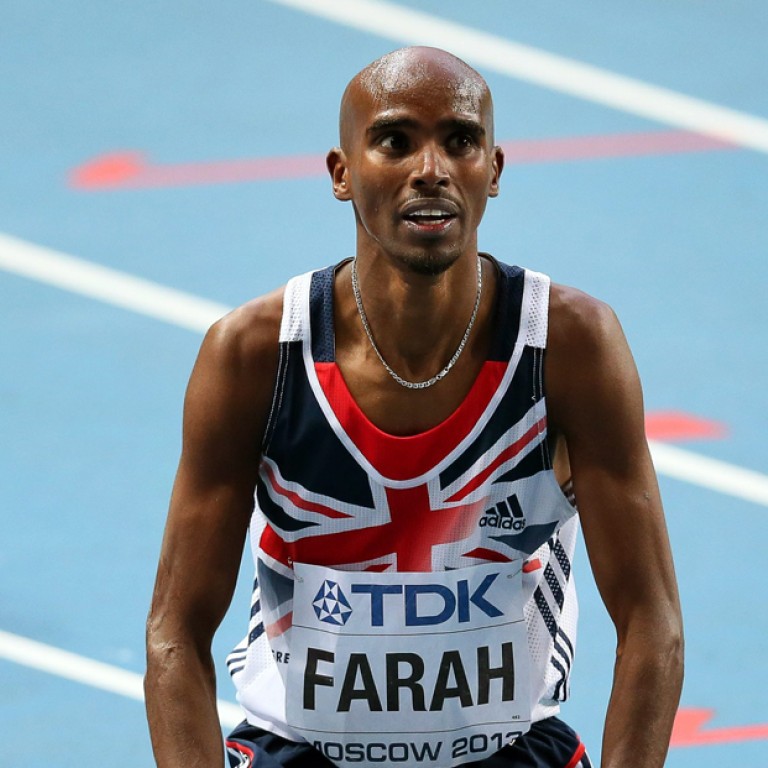
Bigots forced to eat humble pie
They called him a 'Plastic Brit' and even accused him of doping but Mo Farah silenced critics with success on the track
It's an endless cycle that perpetuates itself every time transcendent greatness rears its head in modern sports. Celebration becomes trepidation. The 5,000 metres is far from the sexiest event at track meets, particularly on a day when the fastest man ever, Usain Bolt, is also running in the 200 after already capturing the 100. But 30-year-old Mohamed "Mo" Farah was searching for his own double at the world championships in Moscow, having won the 10,000 six days earlier.
Winning both would give him five world and Olympic titles, a feat never accomplished by a British athlete before. Even if he finished second though, his greatness was irrefutable. At the 2012 London Olympics, he swept gold in both the 5,000 and 10,000 in his hometown and also owns the European record for the 1,500, as well as a gold in the 3,000 at the European indoor championships.
Now imagine Bolt running in the 100, 200, 400 and 800 metres. It will never happen and that's just one more reason Farah has no peer on the track. As the runners took their marks for the 5,000 in Moscow, Farah was a marked man. Both the Kenyans and Ethiopians, the global powers in distance running, had three men apiece in the race and devised a slew of team tactics aimed at slowing down and containing the Olympic champion. Farah was unperturbed.
When asked by the BBC on the eve of the race if he had a message for the folks watching back home, he replied: "Chill out, have a cup of tea. Mo's on the track."
There was nothing chilled about the African contingent on the track though. During the 12-lap race they tried to exhaust and block him until finally, with two laps to go, they thought they had him. As one of the announcers mentioned, it was six against one and who likes those odds? If the one is Farah, I do.
Running flat out on the last two laps it came down to Farah and a seemingly inexhaustible 19-year-old Ethiopian. All the team tactics were done when Farah passed the teenager to win in one of the most scintillating distance races ever. Farah knows how to beat the Africans and well he should because he's one of them. Born in Somalia, he moved to London to join his father when he was eight. A devout Muslim, Farah has felt the sting of racism and ostracism in his adopted land. Before the Olympics referred to him as one of the "Plastic Brits", members of the British team who were born overseas and later acquired citizenship. One writer even asked him after his Olympic victory if he would rather have been running for Somalia. "Look mate, this is my country," he said. "This is where I grew up."
In 2011, he announced he would be moving to Portland, Oregon, to work with legendary runner and coach Alberto Salazar in Project Nike. His regimen has included tracking over gruelling, mountainous terrain in Europe and Africa, as well as sleeping 12 hours a night under a high-altitude tent in his hotel room.
Not surprisingly, Farah's recent success has inspired a spate of drug rumours and accusations. He's come too far too fast, they claim. Nobody can be that good because nobody has ever been that good. It was the Cuban-born Salazar who felt compelled to once again defend Farah against the accusations this past week. "If you don't want people to say things about you, go run real crappy and then nobody will talk about you," said Salazar. "At this level, we know we're clean. We know we're never going to test positive for anything."
One thing is certain: Farah no longer needs to defend his Englishness because he has come to define it. London is easily the most international city in the world with multi-ethnic urban sprawl as far as the eye can see. Eastern Europeans litter the service industry, there are Caribbeans at every turn and continental African refugees as well, not to mention the legions of Asians from virtually every part of the continent.
There's the good and there's the bad, the genuinely pious and the radical extremists. They're all here in Farah's London, in his England. He is the face of English sports and, more importantly, the face of his country as well because he is a winner. Even though he currently resides in Oregon, what Farah has done for migrants in England is immeasurable. And no one, not even the most cynical, can deny that.

